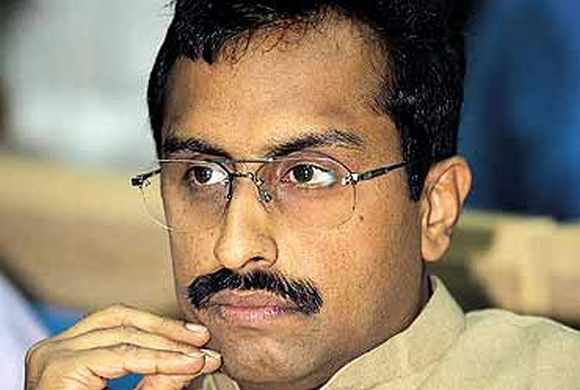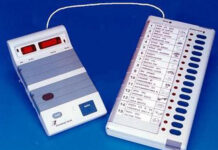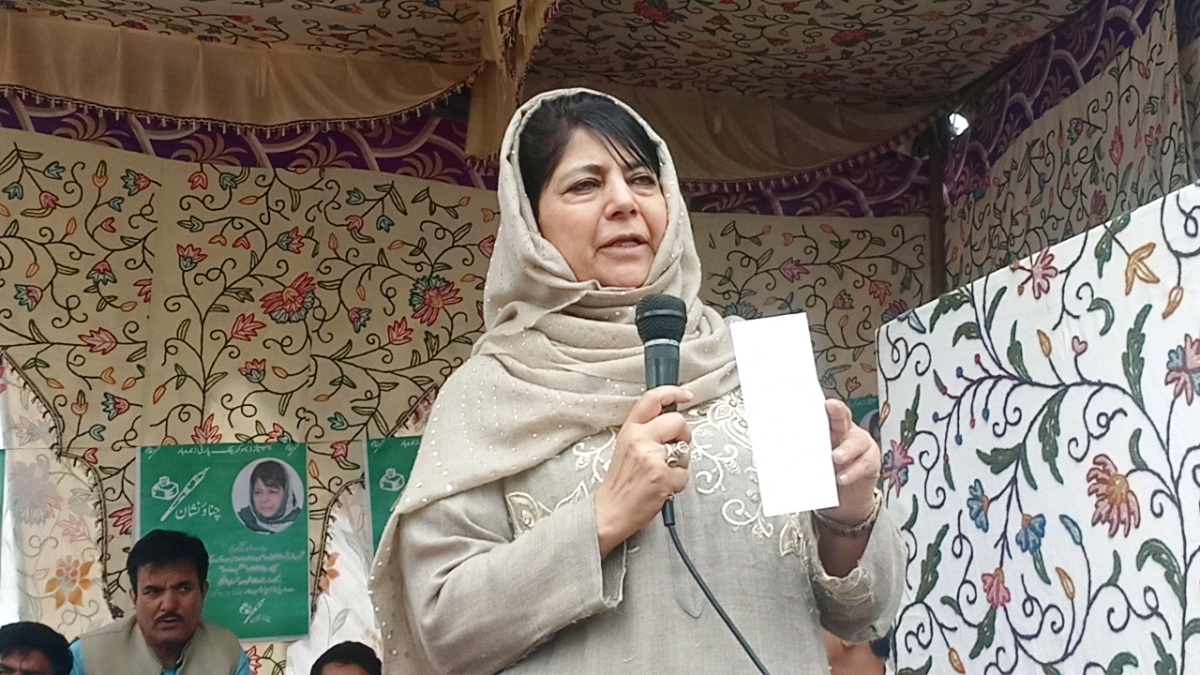The Hindustan Times
KL NEWS NETWORK
SRINAGAR

Ram Madhav
Ram Madhav, the influential BJP general secretary, is a key figure shaping New Delhi’s policy towards Kashmir.
He was the architect of the alliance with PDP; is in close contact with top political leaders in Delhi and Srinagar and the national security establishment; and he also helps shape the government’s foreign policy, particularly towards neighbours.
In his most comprehensive interview on the issue yet, Madhav spoke exclusively to The Hindustan Times on Monday afternoon about the uprising in Kashmir, the government’s actions:
HT: When the PDP-BJP alliance was formed, you wrote that the key priority of the government will be restoring peace. The state has now been crippled for over 50 days, with dozens dead. What went wrong and why has Government of India failed to restore peace and its own authority?
RM: This phase of violence has come as a bit of surprise to all of us. The government of PDP and BJP has been running the affairs of the state quite smoothly for over a year. There was a 3-month gap in between. When Mufti Saheb was chief minister or Mehbooba was CM, we ensured that there was no untoward incident or situation that could lead to this kind of a flare-up. I would like to recall that when such violence happened earlier, there were certain ostensible provocations – based on genuine reasons or on propaganda or illusionary reasons. This time, there was no issue. It definitely came as a surprise. There was no such anticipation of any outburst of violence on the streets. So initially, there was some kind of confusion about how to tackle this situation.
If someone says that because you killed so and so person, this flare up happened, my response would be that in Kashmir, tackling militants has been a day-to-day affair for 20 years. Every successive government has handled militants, terrorists in a particular manner. The same thing happened under this government. I do not buy this theory.
Having said this, one of the major factors has been external forces, namely Pakistan-inspired groups which are responsible for provoking this violence and stone-pelting.
It is unfortunate that it took us 50 days to restore some semblance of normalcy. But curfew has now been lifted in large parts of the state today. We hope that by the time Eid festival comes, ten days from now, the state will limp back to normalcy.
The Political Backdrop
HT: You spoke of being surprised. Critics suggest that the problem is your alliance itself. PDP occupies a particular space in the valley. The valley had voted to keep BJP out. With this alliance, the PDP’s credibility and role as a mainstream political buffer between the radicals and the state eroded. Do you buy this – that the alliance itself caused alienation in the valley?
RM: Absolutely not. I don’t buy this because of a very important and valid reason. It is known that I was thickly involved in the formation of this alliance. Our major worry was that we may be able to stitch this alliance but would the valley accept it?
This used to be the biggest question that used to linger in our minds. After one-and-a-half years, I can now disclose publicly that I used to discuss with Mufti Saheb that once we do this, you should be prepared for a three-month unrest, because people would revolt. People will say you have back-stabbed us, you have ditched us, you will face it in your areas and we will face it in our areas. They will see it as an unexpected kind of arrangement.
But to our great surprise, it was taken as a natural corollary of the situation. I am not calling it a natural alliance, but it was seen as a natural corollary of the mandate that was available to us.
I see a major reason behind the acceptance of this alliance to be the Modi factor.
PM Modi rode to power on one single factor – the hope element.
There was the same hope element in the valley too – that these two parties may belong to opposite poles, but here is a leader under whose dispensation, we can enjoy greater benefits. That hope must have influenced the people of the valley into accepting the alliance.
Now after one and a half years, when there was some violence, if an opposition leader stands in the Rajya Sabha and says it is happening because of this alliance, one should laugh at him.
If this was the reason, it should have happened when the alliance was formed. We were anticipating protests, but no protests occurred.
On the contrary, it was welcomed. And I tell you, when three months ago, when Mehbooba contested the elections in Islamabad, if people in the valley were so unhappy, they should have defeated her. But she won by a bigger majority than her father.
Her father won by 6000 votes; she won by 12,000 votes when the poll percentage was slightly lower.
There are reasons for the outburst. Those opposed to the alliance realised that if we do not make a big noise now, then this alliance will run for six years and we will have no future. Those forces are probably behind today’s unrest.
HT: Are you suggesting the main opposition, NC, is behind the unrest?
I am saying that the main opposition’s diagnosis of the situation is completely flawed. And I would like to remind them that Kashmir has witnessed equally bad, if not worse days, under their rule. I am not blaming any particular party for fomenting trouble. But no party should fish in these troubled waters.
When it comes to Jammu and Kashmir, we all should be together. Together, thanks to initiatives by our PM and Home Minister, we have succeeded in bringing all the parties, including NC and PDP, on the same page.
Current Uprising
HT: Should Burhan Wani’s killing have been handled better? In death, he has become bigger than when he was alive. Were there any tactical mistakes made?
RM: This illusion must be first of all removed, that because of Burhan Wani’s killing, all this has happened.
Killing of militants in the valley, as I said, is not something that this government has started.
On the day that Burhan Wani was killed, two other militants were killed. Before that, militants were killed and after that too, militants get killed.
There is a particular agreed way of dealing with militants. When you are in an encounter, when bullets are flying, you do not look at the bio-data of militants. There is a way to tackle that. One should not have any second opinion on that. The man on the spot who has been assigned the job of tackling the militant group is best positioned to take a call. They took the call which is best in the given situation.
I would still say that killing of militant is not the sole reason for this unrest.
There are agent provocateurs who have been responsible. They may have used a particular incident. They could have used it for ten days.
After Burhan’s death, there was an immediate flare-up. There was violence. Then ten people died. Then deaths of ten people became further trigger. Then agent provocateurs realised that a death a day, a dead body a day, was the best way to continue unrest.
So innocent people, children were used. In hospitals, children are there. Do I have to believe that a boy this young understands this kind of intricate politics, come on the street, and get hit by violence? They made innocent people sacrificial lambs.
HT: But did security forces fall prey to precisely this strategy? Because they were seen as insensitive, because they killed protesters, because they used pellet guns, it gave more ground to those you term as provocateurs.
RM: On the contrary, the security forces have taken great brunt on themselves, severely suffered. Close to 4000 members of forces have suffered injuries of various degrees. A couple of them have died. Some have lost eyes, some have lost limbs, some have permanent injuries. If they were ruthless and insensitive, they would not have taken so much injury. The death toll would also have been much higher. They tried their best to maintain restraint.
As far as pellet guns are concerned, you must remember that these were seen as alternative to regular bullets.
In 2010, when more than 120 people died in various incidents of police firing, it was felt that we should replace it with less lethal means.
I was one of the first to tweet that the situation in J&K should be tackled with non-lethal, less lethal means.
One of the options then was pellet guns. But because of pellet guns, there were injuries which could be permanent. But majorly, deaths were avoided. It is also a way of tackling violent crowds. You have to look for even better non-lethal ways of tackling them.
The Government of India is now seized of the matter. We have constituted a committee, and the committee will give its report. In the given scenario, that was the best available non-lethal option.
HT: You have said Wani’s killing was not the cause. Then does it reflect that there is a deeper political and psychological alienation that still exists on the Kashmiri street viz-a-viz the Indian state?
RM: Whenever there is violence, this debate happens – if Kashmiris are less alienated or more alienated.
No one knows if there is real alienation or not.
You have been listening to this discourse of what percentage of people is involved in this.
Some say 5 percent; some say 50 percent.
I would like to leave it to posterity to decide what is the extent of alienation? We have seen waves of this kind of unrest.
Today’s unrest is confined to mostly four districts of South Kashmir, mostly to rural areas – urban areas have largely remained peaceful, prompting some leaders in the government to believe that probably only five percent of the people are on the streets.
Large numbers of people have shut their shops and are inside their homes. How do you know whether they are pro-India or anti-India?
I have been a closer watcher of Jammu and Kashmir for many years.
I do not believe that ordinary Kashmiris are against India.
If some people provoke a group of people, then this whole talk of Azadi begins.
It has to be taken with a pinch of salt. We will be making a grave mistake if we think all the Kashmiris are anti-India.
Engagement with Separatists
HT: The political figure admired in Kashmir is Atal Bihari Vajpayee. He formulated dialogue within the boundaries of Insaaniyat, and his government initiated dialogue with groups like Hurriyat and even Hizbul. Do you think this government has made a mistake in not reaching out to separatists like Hurriyat? Should that be a logical next step?
RM: Largely, the principle remains the same, whether it was Atal Ji or PM Modi. The J&K issue is not just a law and order issue for us.
We look at it from the perspective of those three terms used fondly – Kashmiriyat, Insaaniyat, and Jamhooriyat.
Now, you must remember that engaging with a group or not engaging with a group is a part of a strategy or a given situation.
If you look at the Common Minimum Programme of the PDP-BJP alliance, it says that it is willing to engage with all the stakeholders in the state.
So where is the question of not engaging?
Rather, they should also try to engage.
The home minister has visited the valley twice; he has kept the doors open to everybody and met a large number of people.
HT: But in such a situation, isn’t the onus on the government to reach out more? In Hurriyat itself, there was a more moderate element willing to engage. But are even the moderates alienated today and has the government lost political channels of communication which should be there?
RM: These are all matters of government strategy.
I don’t want to comment on what should have been done or not done viz-a-viz the local separatists.
I would say the bigger challenge is for the separatists themselves today.
So-called separatists today seem to be no longer in the reckoning in the valley. It is a question they have to ask themselves. The agent provocateurs don’t seem to listen to even so called established separatists. Of course, that is their problem.
As far as engagement is concerned, PM himself has said that dialogue, love and affection, talking to various sections of people is the way forward.
There is no other long-term solution to the issues. We will deal with all sections of the valley society.
HT: Did PM’s political outreach come too late?
RM: These decisions are best left to leaders. They know what is the right time. They are the best judges of the situation.
Future Roadmap
HT: If you were to give us a roadmap of how to address the Kashmir issue, both in the immediate and medium-term, what would it be?
There are no instant solutions to these things. First, we should be unanimous on certain issues.
We all should decide that there is no place for violence, and anti-India activism.
We all should be on the same page with regard to no Azadi, no militancy.
No political party or social group should entertain this.
Jammu and Kashmir is an integral part of India. Militancy has to be tackled with a tough hand.
At the same time, we are ready to engage with people of Jammu and Kashmir based on what Atal Ji used to call Kashmiriyat, Insaaniyat and Jamhooriyat.
The Government of India is ready to address genuine issues faced by the people. A Rs 80,000 crore package has been announced and many initiatives are already underway under this.
In fact, I often say that probably, the main reason behind the spurt in violence is that if this government of PDP-BJP succeeds in delivering good governance, they will have no future. We have to defeat those designs.
HT: You are addressing the development component through the package. But what are your thoughts on the political component? There are some who ask for Azadi; your party’s traditional position is abrogation of Article 370. Can models of autonomy be the meeting point?
RM: Every state in the country has freedom to ask for the moon within the four walls of the Indian Constitution. That is applicable to J and K situation.
HT: Can you consider the restoration of the pre-1953 status?
RM: As I said, anything within the framework of the Indian constitution – let them ask, let the Indian Parliament decide.
HT: There is already a more than decade-old resolution for autonomy of the J&K assembly. But nothing happened.
RM: This question was to be addressed by several successive governments. This is a call the entire nation has to take. States have sufficient autonomy.
For PM Modi, it is an article of faith to empower states.
He believes in cooperative federalism.
That is why I said you can ask for the moon, within the framework of the constitution. Any other thing, it is the responsibility of the Indian parliament to decide, not for any one party to decide.
(This is a briefly edited version of the interview which first appeared in The Hindustan Times.)















